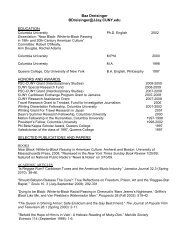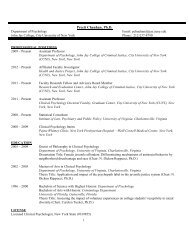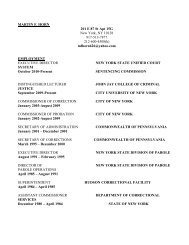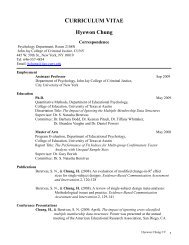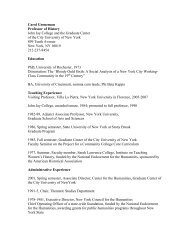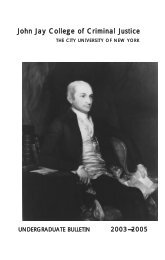Bulletin - John Jay College Of Criminal Justice - CUNY
Bulletin - John Jay College Of Criminal Justice - CUNY
Bulletin - John Jay College Of Criminal Justice - CUNY
Create successful ePaper yourself
Turn your PDF publications into a flip-book with our unique Google optimized e-Paper software.
Courses <strong>Of</strong>fered<br />
POL 237 Women and Politics<br />
3 hours, 3 credits<br />
This course provides students with an opportunity to consider the<br />
presence of women in political institutions and how a range of<br />
political and policy issues pertain to women. It introduces students to<br />
the history of women’s entry to political life, their struggles for equal<br />
rights and representation, and their current roles and representation in<br />
electoral politics. Students will also examine how a range of political<br />
issues such as prostitution, same-sex marriage, and abortion impact<br />
women in the United States and, where comparison is useful, abroad.<br />
Prerequisites: ENG 101, GOV 101 or POL 101<br />
POL 242 U.S. Foreign Policy in Latin America<br />
(Same course as HIS 242 and LLS 242)<br />
3 hours, 3 credits<br />
U.S. economic and political relations with the Latin American<br />
countries during the 19th and 20th centuries. U.S. reactions to reform<br />
and revolutionary movements. The ideological framework of U.S.<br />
foreign policy.<br />
Prerequisites: ENG 101, and GOV 101 or POL 101 or permission of<br />
the section instructor<br />
POL 244 The Politics of Immigration<br />
3 hours, 3 credits<br />
Debates over immigration in the United States are often heated and<br />
contentious. After taking this course, students will understand the<br />
full range of positions in these debates, and will be able to develop<br />
and clearly articulate their own position on contemporary<br />
immigration politics. Students will learn essential terms used in<br />
migration studies, explore historical political debates over<br />
immigration, and analyze the contemporary politics of immigration in<br />
the United States, including debates over border militarization,<br />
unauthorized (“illegal”) immigration, amnesty, employer sanctions,<br />
sanctuary cities, guest worker programs, the shifting balance of<br />
power between federal, state, and local governments; and<br />
immigration law and policy. Students will read a variety of scholarly<br />
and popular texts, as well as key Supreme Court decisions.<br />
Prerequisites: ENG 102 or 201, GOV 101 or POL 101 or<br />
permission of the instructor<br />
POL 246 Politics of Globalization and Inequality<br />
3 hours, 3 credits<br />
What political processes allow for some countries to become rich<br />
while others remain very poor What are the political and historical<br />
conditions responsible for recent and past financial crises Since<br />
politics is the struggle over who gets what, why and how, interactions<br />
between the state and civil society have a strong influence over<br />
economic outcomes and the distribution of money and resources.<br />
This class takes a political economy approach to understanding<br />
globalization and inequality, by emphasizing the political, socially<br />
imbedded and historically contingent aspects of our global economy.<br />
This course surveys the major theories, key institutions and<br />
contemporary issues in international political economy. Topics<br />
include the history of global inequality, the politics of international<br />
trade, institutions such as the International Monetary Fund, the<br />
politics of oil, and issues of economic justice including colonialism,<br />
financial crises, and poverty.<br />
Prerequisites: ENG 101; GOV 101 or POL 101 or permission of the<br />
instructor<br />
POL 250 International Law and <strong>Justice</strong><br />
3 hours, 3 credits<br />
An introduction to the key concepts and processes of the international<br />
legal system. Special emphasis will be placed on the foundations and<br />
justifications for international law, the relationship between treaties<br />
and custom, state sovereignty and recognition, and the use of force by<br />
states in the international system. An examination and assessment of<br />
the relation of municipal and international law, the role of the<br />
International Court of <strong>Justice</strong>, and the prospects for a permanent<br />
international penal tribunal.<br />
Prerequisites: ENG 101, GOV 101 or POL 101<br />
139



